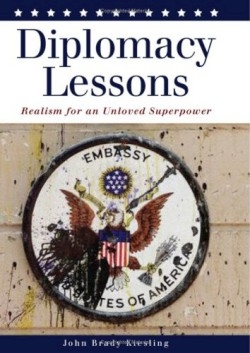Diplomacy Lessons
Realism for an Unloved Superpower
For readers in search of a policy-wonk book to be placed on a bedside table as literary “Lunesta,” and pulled up for a page or two of reading before dropping off, this is not the right prescription. This powerfully written analysis of the U.S. role as the only superpower left on the planet will keep an intelligent seeker of political reality awake and alert long after bedtime.
At its core, the book examines and critiques contemporary U.S. foreign policy, with a focus on the war in Iraq. The author explores both “big picture” issues—providing a clear exposition of the U.S. relationship with the United Nations— and “small picture” moments— like a fascinating account of election-monitoring in Armenia. Anchored in a well-defined historical context and with an intimate knowledge of the workings of bureaucracy and diplomacy, this volume is both an indictment of current policy and a trumpet call to responsible change. If that were all that Diplomacy Lessons had to offer, it would deserve attention; but it does more than merely reveal the strengths and weaknesses of American diplomacy and propose some well-reasoned solutions.
It is rare to find a book about contemporary international relations that reads as much like literature as it does like analysis, but the author understands the world as “story.” It is this understanding of narrative, deep commitment to curiosity, and reverence for the practical and creative aspects of humanity’s attempts to get along that make this book exceptional. It also has the virtue of a sense of humor, which erupts delightfully not only in the text and footnotes, but in the fact that, for his readers’ enlightenment and amusement, Kiesling has left visible the blacked-out sections deleted by security censors.
The author comes to his topic with outstanding credentials. A twenty-year veteran of the Foreign Service, he served in Europe, North Africa, and the Middle East. In February 2003, at the height of his career, he was the first U.S. diplomat to resign his post in protest of the impending war with Iraq. His resignation letter, which appeared in the New York Times, brought a public servant’s courageous dissent to the notice of the general public. Kiesling’s personal story winds through the narrative of his book. His candid insights provide a profoundly humane lens through which to view the story he tells, and helps readers enter the book as dialogue as much as exposition.
Diplomacy Lessons is angry without being cynical; it shows passionate commitment to the common good and to those who work for understanding. It provides constructive remedies as well as critique of an “unloved superpower,” and so demonstrates that idealism and realism are not incompatible but essential partners in a healthy world. At the end of the day it is most an act of hopeful citizenship, one that will inspire readers to understand their world in a new way.
Reviewed by
Vicki Hughes
Disclosure: This article is not an endorsement, but a review. The publisher of this book provided free copies of the book to have their book reviewed by a professional reviewer. No fee was paid by the publisher for this review. Foreword Reviews only recommends books that we love. Foreword Magazine, Inc. is disclosing this in accordance with the Federal Trade Commission’s 16 CFR, Part 255.

